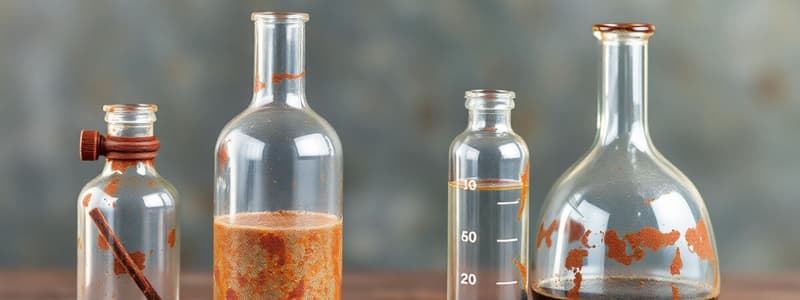Podcast
Questions and Answers
Which of the following describes a reaction that involves heating?
Which of the following describes a reaction that involves heating?
- Rusting of iron
- Filtration
- Thermal decomposition (correct)
- Photosynthesis
What is produced when an acid reacts with a carbonate?
What is produced when an acid reacts with a carbonate?
- Salt and water
- Hydrogen and oxygen
- Salt, carbon dioxide, and water (correct)
- Oxygen and carbon dioxide
Which chemical change is primarily driven by light?
Which chemical change is primarily driven by light?
- Photosynthesis (correct)
- Thermal decomposition
- Combustion of petrol
- Rusting of iron
What is the primary outcome of combustion?
What is the primary outcome of combustion?
Which of the following processes can separate components of a mixture?
Which of the following processes can separate components of a mixture?
Which of the following equations represents neutralization?
Which of the following equations represents neutralization?
What does the chemical reaction of rusting involve?
What does the chemical reaction of rusting involve?
What is a common effect of combustion in daily life?
What is a common effect of combustion in daily life?
What distinguishes a chemical change from a physical change?
What distinguishes a chemical change from a physical change?
Which of the following is NOT a characteristic of a chemical change?
Which of the following is NOT a characteristic of a chemical change?
Which process is an example of a chemical change?
Which process is an example of a chemical change?
What happens during a chemical change compared to a physical change?
What happens during a chemical change compared to a physical change?
Which of the following statements correctly describes a physical change?
Which of the following statements correctly describes a physical change?
Which of the following would indicate a chemical change has occurred?
Which of the following would indicate a chemical change has occurred?
What is typically true about chemical reactions?
What is typically true about chemical reactions?
In which type of change do the properties of the substances remain unchanged?
In which type of change do the properties of the substances remain unchanged?
What process is used to coat an object with a metal using an electric current?
What process is used to coat an object with a metal using an electric current?
What is essential for rusting to occur?
What is essential for rusting to occur?
How can rusting be prevented effectively?
How can rusting be prevented effectively?
Which item is NOT a common application of electroplating?
Which item is NOT a common application of electroplating?
Which of the following metals is typically used for electroplating to improve conductivity?
Which of the following metals is typically used for electroplating to improve conductivity?
What is a common use of electroplating in the medical field?
What is a common use of electroplating in the medical field?
What is the chemical formula for the product of rusting?
What is the chemical formula for the product of rusting?
Why is electroplating advantageous in manufacturing?
Why is electroplating advantageous in manufacturing?
Flashcards are hidden until you start studying
Study Notes
Chemical Changes
- Chemical Change: A process where new substances are formed; often irreversible.
- Physical Change: Involves no new substances; generally reversible.
Types of Chemical Changes
- Mixing: Reactions occur when two or more reactants are combined.
- Acid Reactions:
- Acid + Metal → Salt + Hydrogen
- Acid + Base → Salt + Water
- Acid + Carbonate → Salt + Carbon Dioxide + Water
- Acid Reactions:
- Heating: Necessary for reactions like thermal decomposition and combustion.
- Thermal Decomposition:
- Example: Calcium Carbonate → Calcium Oxide + Carbon Dioxide
- Combustion:
- Example: Petrol + Oxygen → Carbon Dioxide + Water
- Thermal Decomposition:
- Exposure to Light: Reactions that occur in the presence of light.
- Photosynthesis:
- Carbon Dioxide + Water → Glucose + Oxygen
- Photosynthesis:
- Interaction with Oxygen (Oxidation):
- Rusting occurs only with iron, requiring moisture and oxygen to form hydrated iron(III) oxide.
Rusting
- Rusting formula: Iron + Water + Oxygen → Hydrated Iron(III) Oxide.
- Requires both moisture and oxygen to form rust.
- Prevention methods include painting or oiling iron to block moisture and oxygen.
Respiration
- Example reaction: Glucose + Oxygen → Carbon Dioxide + Water.
- Vital for energy production in living organisms.
Electrochemistry
- Electroplating: Coating objects with a thin metal layer using electric current.
- Applications:
- Used for aesthetic coatings on trophies, jewelry, etc.
- Forms protective layers against corrosion on metal appliances.
- Enhances conductivity in electronics by using gold/silver coatings.
- Employed in medical devices for implants and surgical tools.
- Notable Achievement: Singapore's development of gold-encapsulated orchids since 1976.
Importance of Chemical Changes
- Critical in daily life for processes such as cooking, energy production, and manufacturing.
- Understanding these reactions aids in applying preventive measures against issues like corrosion and engages in innovations in technology and health.
Studying That Suits You
Use AI to generate personalized quizzes and flashcards to suit your learning preferences.



